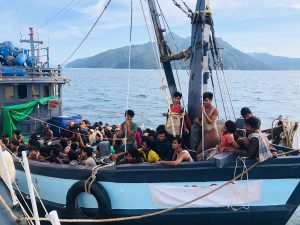On April 23, Bangladesh’s coast guards conveyed a clear message stating, “Not a single Rohingya will be allowed to enter [Bangladesh].” A commentary mirroring the government’s position painted in a recent interview by Foreign Minister Abdul Momen. Robust words carrying a sense of déjà vu recounting back to the 70s, when Vietnamese boat people sought refuge in neighboring nations, but were profusely denied entry.
A similar occurrence took place in April when Italy closed its ports on the basis of public health concerns. Malaysia’s latest denial of entry to a boat carrying 200 Rohingya refugees was warranted on the same grounds, as was the case in Cyprus. A treacherous pattern is raising implications as to whether governments are using the global pandemic as a pretext to ignore international law by systematically overlooking the notion of non-refoulement. A concept faintly known by the casual reader yet a crucial principle established in international law, non-refoulement forbids governments from returning refugees and asylum seekers to countries where they fear persecution. Notably, the norm is found under the 1951 UN convention relating to the status of refugees, to which Malaysia is not a party; however, the principle is likewise accentuated in general international human rights law.
Undoubtedly, public health serves as a valid cause to invoke extraordinary national security measures, nonetheless in delicate times such as these, the international community should hold nations accountable in order to avoid closing ports of entry. As UNHCR highlights, we are currently “witnessing the highest levels of human displacement on record.” Figures include 70.8 million forcibly displaced persons, of which 41.3 million are internally displaced. Of the current prevalent refugee crisis (Syria, Afghanistan, South Sudan, Myanmar and Somalia), it is noted that the amount of asylum seekers have not decreased, but rather augmented. Thus, alluding to the notion that international law must not be ignored nor diminished, and stricter condemnation must be elevated in order to avoid a worsening of the world’s largest humanitarian emergency.
As the western world has been heavily impacted by the ripple effects caused by COVID-19, nations must work closely to uplift the importance of respecting international law, specifically when it comes to implementing new national norms. A shift in stance on refugee policy has been emerging over the past couple of months, as seen in January with Ethiopia’s denial of asylum seekers requesting refugee status, where children have been impacted the most. In December, UNHCR claimed 27 percent of children arriving at Ethiopian refugee camps were unaccompanied. Even though Ethiopia has not based their redefined policies on public health grounds, a pandemic seems to serve as a reasonable delineation as to why refugees should not be seeking asylum. Concerns however remain as to whether countries will deploy the “public health” rationale for a prolonged period, resulting in temporary policies becoming indefinite ones.
The repercussions of implementing a closed port policy could let “seas become graveyards” as noted by Amnesty International’s Clare Algar. The risk of not respecting the notion of non-refoulement could ignite a potential humanitarian crisis, which would be a challenging task for nations to address, let alone in chorus with a global pandemic. For this reason, it is important to note the trends emerging as of now. Even Canada, a nation that generally implements a friendly refugee policy, has issued a hard line on asylum seekers who arrive through unofficial ports of entry.
National emergencies over time have given nations excuses to set international law aside and broaden domestic powers. As seen with post 9/11 policies, the U.S. government “held people without charge for almost a decade, engaged in torture as that term is understood in international law, and sent people abroad for questioning to countries known to engage in what everyone must agree is torture”. Nations should unite to refrain from violating basic human rights laws, especially given the fact that this pandemic can give governments leeway to diminish the human rights standards and establish a customary practice of respecting human rights only when they sense it is suitable to do so.
The risk of falling into policies that overshadow basic human rights remains high, but positive measures have emerged as nations such as Pakistan have undertaken roundtable meetings where the Federal Minister for Human Rights, for example, discussed the need to assist Kashmiri woman and girls as the pandemic makes them vulnerable to “discrimination, marginalization, abuse and violence from the state.” The Pakistani roundtable included various stakeholders ranging from the United Nations to NGOs focusing on women’s rights.
Other than promoting the respect of human rights, nations should further ensure that contributions to the UN’s humanitarian aid projects continue. With the UN suspending rotations of uniformed personnel at all 13 peacekeeping missions, in order to avoid a similar repeat of the 2010 Cholera spread, it is imperative that nations do not pull their contributions, as the UN is often seen as a lifeline for millions of vulnerable people. While UN aid agencies such as UNHCR and UNICEF continue their field operations, they are in dire need of strengthened support. With the Trump administration recently issuing a hold on funding targeting the World Health Organization, nations should refrain from doing the same, as the consequences will be devastating for imperiled refugees and asylum seekers.
As the world finds itself at a crossroads, where governments seem to diminish human rights in order to advance national security, officials should look to Harry Truman for wisdom: “Any denial of human rights is a denial of the basic beliefs of democracy.” With nations reevaluating their positions on “reopening” their streets, they should further focus on revising their temporary asylum bans in order to give a clear stance on their position with respect to international law. After all, as seen in U.S. law, international treaties made pursuant to the constitution remain the supreme law of the land.
Pierfilippo M. Natta holds an LLM from Duke University, School of Law and has worked with refugees in Myanmar.

































